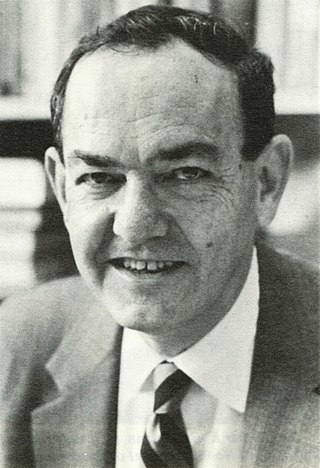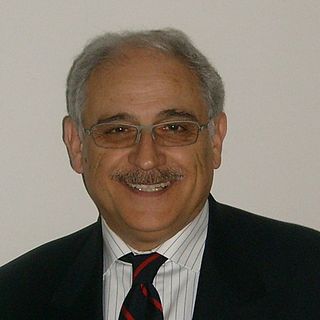
Herbert Alexander Simon was an American political scientist, with a Ph.D. in political science, whose work also influenced the fields of computer science, economics, and cognitive psychology. His primary research interest was decision-making within organizations and he is best known for the theories of "bounded rationality" and "satisficing". He received the Nobel Memorial Prize in Economic Sciences in 1978 and the Turing Award in computer science in 1975. His research was noted for its interdisciplinary nature and spanned across the fields of cognitive science, computer science, public administration, management, and political science. He was at Carnegie Mellon University for most of his career, from 1949 to 2001, where he helped found the Carnegie Mellon School of Computer Science, one of the first such departments in the world.

The Gothenburg School of Business, Economics and Law at the University of Gothenburg is one of Sweden's leading business schools, located in Gothenburg. It was founded in 1923 as an independent business college and is situated in the centre of the city. In 1961, it was integrated into the state-run university system, still as a separate college, but then was integrated into the University of Gothenburg in 1971.

James Gardner March was an American political scientist, sociologist, and economist. A professor at Stanford University in the Stanford Graduate School of Business and Stanford Graduate School of Education, he is best known for his research on organizations, his seminal work on A Behavioral Theory of the Firm, and the organizational decision making model known as the Garbage Can Model.
Organizational behavior (OB) or organisational behaviour is the: "study of human behavior in organizational settings, the interface between human behavior and the organization, and the organization itself". OB research can be categorized in at least three ways:
Futurists are people whose specialty or interest is futurology or the attempt to systematically explore predictions and possibilities about the future and how they can emerge from the present, whether that of human society in particular or of life on Earth in general.
Strategic thinking is a mental or thinking process applied by an individual in the context of achieving a goal or set of goals. As a cognitive activity, it produces thought.
Ian Irving Mitroff is an American organizational theorist, consultant and Professor Emeritus at the USC Marshall School of Business and the Annenberg School for Communication at the University of Southern California He is noted for a wide range of contributions in the field of organizational theory from contributions on strategic planning assumptions and management information systems, to the subjective side of the workplace and spirituality, religion, and values.

The Faculty of Data and Decision Sciences is an academic faculty of the Technion and the oldest such department in Israel. The department is currently headed by Prof. Rann Smorodinsky and is based in the Cooper and Bloomfield buildings at Technion City. The department employs 52 faculty members, who as of 2023 served a total of 500 graduate and 1000 undergraduate students.
Debora Hammond is an American historian of science, former Provost and Professor Emerita of Interdisciplinary Studies of the Hutchins School of Liberal Studies at the Sonoma State University. She is known as author of the 2003 book The Science of Synthesis: Exploring the Social Implications of General Systems Theory, and as 2005–06 President of International Society for the Systems Sciences.
Michael Christopher Jackson OBE is a British systems scientist, consultant and Emeritus Professor of Management Systems and former Dean of Hull University Business School, known for his work in the field of systems thinking and management.

John Pourdehnad is an American organizational theorist, and consultant. He is associate director of the Ackoff Center for Advancement of Systems Approaches (ACASA), and Affiliated Faculty in the Organizational Dynamics Graduate Program at the University of Pennsylvania.
Werner Ulrich is a Swiss social scientist and practical philosopher, and a former professor of the theory and practice of social planning at the University of Fribourg. He is known as one of the originators of critical systems thinking (CST) and in particular for the development of critical systems heuristics.
Paul J. H. Schoemaker, Ph.D. is an academic, author, and an expert in the fields of strategic management and decision making.
Sjoerd Abel Georges Lodewijk Romme is a Dutch organizational theorist and professor of entrepreneurship and innovation at the Eindhoven University of Technology.
John Peter van Gigch was an American organizational theorist and Professor Emeritus in System Management at the California State University.
Stefan N. Grösser (born May 1, 1978 in Göppingen is a German economist, and professor of strategic management and dean at the Bern University of Applied Sciences.
Daniel A. (Dan) Wren is an American business theorist and Emeritus Professor at the University of Oklahoma, especially known for his 1972 book coauthored with Arthur G. Bedeian, entitled "The evolution of management thought."
Neuromanagement uses cognitive neuroscience, among other life science fields, and technology to analyze economic and managerial issues. It focuses on exploring human brain activities and mental processes when people are faced with typical problems of economics and management. This research provides insight into human decision-making and other general social behavior. The main research areas include decision neuroscience, neuroeconomics, neuromarketing, neuro-industrial engineering, and neuro-information systems. Neuromanagement was first proposed in 2006 by Professor Qingguo Ma, the director of Neuromanagement Laboratory of Zhejiang University.
Luc Sels is a Belgian sociologist.





